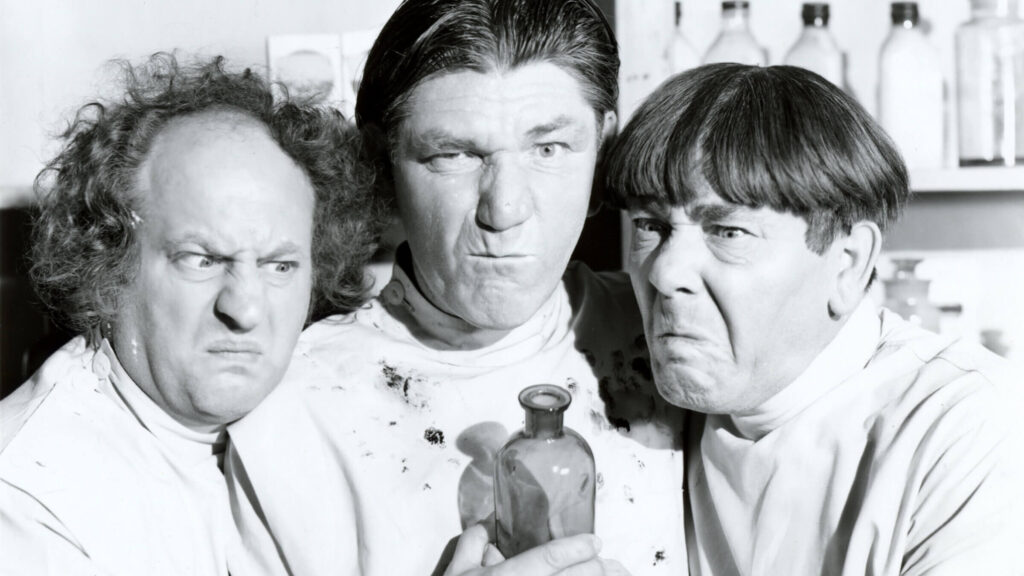The People of the Joke: American Jews and Comedy
Why is humor synonymous with Jews, and are Jews disproportionately represented in comedy industries?

(Image source: Getty Images)
Why is humor so synonymous with Jews? The association has become a badge of honor for many American Jews, but the history of how and why Jews became associated with humor leaves questions about how much of that association is real, and how much is mythic. Moreover, the question of what makes comedy “Jewish” is both impossible to answer and necessary when considering the relationship between Jews and humor in the United States.
American comedy, Steve Allen opined in his 1981 book Funny People, is “a sort of Jewish cottage industry.” Allen wasn’t Jewish, but he estimated, without any bitterness or resentment, that 80% of comedy professionals in this country were Jewish. As far as Allen and others were concerned, this was not news; he was just saying the quiet part out loud. Everyone knew, or thought they knew, that American comedy was Jewish comedy and vice versa. Sure, you had gentiles like Will Rogers and Mark Twain, but the kind of comedy Allen was discussing—TV, film, stand-up—was all Jews, all the time. American comedy insiders like Allen knew it in 1981. Non-American outsiders seemed to know it as well, at least to the extent that in 2004’s Spamalot, Britain’s Eric Idle cheekily observed that “you won’t succeed on Broadway if you don’t have any Jews.” And if you looked at bastions of American comedy like Saturday Night Live, you’d learn that SNL bandleader Paul Shaffer hosted a Passover seder for the disproportionately large Jewish cast and crew of the show, and that a seder at Sid Caesar’s house included Mel Brooks, Carl Reiner, Jeffrey Ross, Lainie Kazan, and Estelle Harris among other Jewish comedy legends. Despite the fact that SNL has only done occasional Jewish sketches (including Adam Sandler’s now-iconic “Hanukkah Song”), and Sid Caesar’s most notable Jewish performances were on Chabad telethons, Jewish humor fans view both SNL and Caesar as examples of Jewish comedy.
In order to understand the many reasons why something may be considered Jewish humor, from being created by Jews to direct Jewish references, we need to look at some of the attempts to define Jewish humor and the types of jokes that are most commonly associated with Jewish comedy. By thinking through the history and meaning of Jewish humor, we can begin to untangle what the changing (and increasingly diverse) notion of American Jewish identity might do to our conception of Jews and humor.
***
Depending on who you ask, the purported relationship between American comedy and Jews has always been true, or has never been true. It is a truth universally acknowledged, or it is an antisemitic myth of Jewish media control.
Beyond the fact that the conflation of American humor and Jewish humor is more legend than reality, is the problem of trying to pin down what “Jewish humor” actually means. For one perspective, Jewish studies scholar Jeremy Dauber argues in Jewish Comedy: Serious Business that Jewish humor must be both created by Jews and “must have something to do with either contemporary Jewish living or historical Jewish existence.” The first part is simpler, although still not simple. There is no rubric for what makes someone “Jewish enough” for their comedy to be considered Jewish. The second part, however, is nearly impossible to quantify, which Dauber admits. Joseph Telushkin, in his book Jewish Humor: What the Best Jewish Jokes Say about the Jews describes this part of the equation as “Jewish sensibilities.” He argues that to be considered “Jewish” a joke must “apply to Jews” and express Jewish concerns, which range from anxiety about family or money to worries over antisemitism. He does not specify, as Dauber does, that a joke needs to be produced by Jews, but it seems he takes that part as self-evident.
If there is such a thing as Jewish humor, then its definition lies somewhere in this ephemeral collection of “Jewish sensibilities “or “the Jewish experience.” In the United States, until recently, “the Jewish experience” has generally meant the experiences of Jews whose families emigrated here from central or eastern Europe in the second half of the 19th and the early 20th centuries. This Ashkenazi—or Ashkenormative—history of American Jewry contributes to what linguists call “shm-reduplication” (a linguistic feature of Yiddish) as a constitutive element of Jewish humor. Jews, this thinking goes, came to this country speaking Yiddish, and Yiddish speakers who learned English developed certain linguistic habits. So, whether it is the shm-reduplication of “Joe Shmo” or the subject/verb inversion in jokes like the Jew on a desert island who built two synagogues because “in that one I pray, but in that one I wouldn’t set foot” there are linguistic habits common amongst eastern European Jews that have become synonymous with Jewish comedy as a whole.

(Image source: Getty Images)
Additionally, when we think about the different kinds of jokes that are common in contemporary comedy, several of them seem especially prevalent in Jewish humor. Defense mechanism humor is one example. There is an old joke about a Jewish man moving in next to notable antisemite Henry Ford. Ford accosts his new neighbor and says, “I bet you think that by moving here you’re as good as I am, don’t you?” The neighbor responds, “No, I think I am better than you are.” Ford apoplectically demands, “How do you figure that?” And the man replies, “Well for one thing I don’t live next door to a Jew.”
Defense mechanism humor is a major reason why people like Steve Allen think Jews are inherently funnier than other people. This is the same thing that has motivated generations of kids who feel bullied to make self-deprecating jokes before the bullies get a chance to make them. If you laugh at yourself first, you remove the power of others to make a joke at your expense. Many people see the history of Jewish persecution as an impetus for developing a cultural inclination toward self-deprecating, defensive humor. Or, as some call it, “relief humor.” This would be like the joke that all Jewish holidays are just variations of “They tried to kill us. We won. Let’s eat.” Whether Jews are using humor defensively or reflexively, many people see antisemitism as the root of Jewish humor.
Others, however, argue that the social status of Jews in American society is the driving force behind Jews’ dominance in American comedy. This theory argues that Jews occupied a special place in 19th and early 20th century America. As non-English speaking immigrants, they were outsiders. As a white-passing group, however, they benefited from many of the privileges extended to whites. Some saw in Jews the myth of the model minority who best adapted to American life; they learned English, gained an education, moved out of impoverished ethnic enclaves within one generation, and became “good Americans” faster than other non-WASP communities.
Those who see upward social mobility as part of the puzzle of Jewish humor point to Seinfeld and the many copycat sitcoms of the 1990s that featured Jewish stand-up comedians (including Paul Reiser’s Mad about You, Richard Lewis’ Anything but Love, and Fran Drescher’s The Nanny). These were all shows about middle or upper-middle class Jews living “average” sorts of lives, with only occasional, vague references to their Jewishness. Because Jews had joined the white majority, they could be considered just another white demographic that could lend color to an otherwise cookie-cutter sitcom. Networks were comfortable with an endless procession of shows about various white people (like Southerners in Grace under Fire or Designing Women, blue collar families on Roseanne or Everybody Loves Raymond, blended households like on Full House or Step by Step, etc.) but a network rarely aired more than one Black sitcom at the same time and shows featuring other people of color were nearly non-existent.
We must keep the history of Ashkenazi Jews moving from social outsiders to part of the white majority in mind to understand why some Jews see the Jewish association with humor as a point of pride. And that pride has contributed to even more comedy, what some call “superiority humor,” which comes from a sense of feeling, well, superior. Take, for example, the Three Stooges, who were all Jewish. When watching the Three Stooges everyone in the audience can, in theory, participate in the superiority of feeling smarter than the Stooges, of knowing you would not let yourself get into the situations in which the Stooges find themselves.

(The Three Stooges. Image source: Getty Images)
Some superiority humor comes from knowing that you have gotten a joke that not everyone will understand. If we return to the Three Stooges for a moment, other jokes in the Stooges’ repertoire were clearly not for everyone. Here the Stooges frequently threw in Yiddish words and phrases that the majority of the audience may have thought were just gibberish, but their Yiddish-aware audience would recognize. In 1940’s You Nazty Spy, for example, they use “shalom aleichem” (literally “peace to you,” a common Jewish greeting), exclaim “beblach” (“beans” in Yiddish), and when Moe is giving a dictatorial speech from a balcony at one point he says “in pupik gehabt haben” which is a borderline vulgar Yiddish phrase that translates to something like “I have had it in the bellybutton.” A tiny percentage of the Stooges’ audience would have spoken Yiddish, so this was the most insider of inside jokes, but that sort of superiority humor depends on making some segment of the audience feel as though they have been let in on a secret the rest of the audience has missed.
By the mid twentieth century Jews had become, broadly speaking, part of the American mainstream. They were one of the legs of Will Herberg’s tri-faith America in Protestant, Catholic, Jew, and they no longer stood as far outside the social norm as they had in the Marx Brothers’ heyday. Fewer and fewer American Jews knew Yiddish, so even the Three Stooges’ type of insider humor transitioned to broader references to Jewish holidays, foods, grandmothers, and guilt. These are the type of inside jokes that outsiders can still “get,” but where the insider will laugh harder or get it “more.” As jokes about hectoring Jewish mothers, raucous family seders, and awkward bar mitzvah parties became common, they functioned as jokes that most of American audiences would understand. Jews themselves got the small thrill of being more in on the joke than those who understand it only on an intellectual level. In turn, it became harder and harder to identify something as a “Jewish sensibility” when almost anyone in the audience can relate to it, even if Jews may relate a little more.
This subtle shift could help explain why the association between Jews and humor has been regarded as an early to mid-twentieth century phenomenon. As comedy has become more diverse, Jews are a less overwhelmingly pervasive demographic in comedy clubs and writers’ rooms. This is, of course, difficult to quantify. But if Steve Allen was right that Jews were 80% of comedy writers in 1981, then based on the 2005 documentary The Aristocrats – which profiles 100 comedians and comedy writers, of whom only about 40% are Jewish – the picture seems clear that the demographics of comedy are changing.
Today, our image of what “Jewish” means is becoming more diverse and less Ashkenormative. Are the “Jewish sensibilities” of an Eritrean Jew like Tiffany Haddish anything like those of a white, Ashkenazi Jew like Sarah Silverman? Eric Andre’s mother is Ashkenazi, but he grew up as a Black man in America, so will his experience of antisemitism resemble that of Jerry Seinfeld? Venezuelan Jewish comedian Joanna Hausmann has to balance her mother’s Venezuelan-Cuban background wither her Holocaust-survivor paternal grandparents. Her notion of what it means to not “look Jewish” is not going to be the same as someone who is blonde but still Ashkenazi, like Amy Schumer.
Our image of an increasingly diverse Jewish community can only be a good thing. The idea of “Jewish humor,” has long depended on the intangible sense of what “Jewish” means that stems from the overwhelmingly white, Ashkenazi American Jewish experience.
What is “Jewish humor” if “Jewish” and “Ashkenazi” stop being automatically synonymous? One answer is that “Jewish humor” will refer to humor produced by Jews that relates to the experiences of some Jews, even if it is not the experience of most Jews. Another possibility is that Jewish humor will become better known as a style of humor that is based on certain types of jokes or approaches to satire, but a style that can be done by anyone, Jewish or not. Jojo Rabbit and its ridiculous depiction of Hitler may be considered Jewish humor because writer/director/star Taika Waititi is Jewish. Is Inglorious Basterds Jewish humor because it is a similar form of revenge fantasy that reduces Nazis to ridiculous buffoons, or can it never be Jewish humor because the filmmaker, Quentin Tarantino, isn’t Jewish?
Insofar as there is no single understanding of what makes some humor Jewish, there will be no consensus on what the new frontier of Jewish humor will look like. Nevertheless, it seems clear that whatever it may signify, the label of “Jewish humor” will continue to be used, and the idea that Jews and comedy are intertwined will persist. After all, laughter is the best medicine. And if Jews know one thing, it’s medicine.
Jennifer Caplan is the Jewish Foundation of Cincinnati Chair in Judaic Studies at The University of Cincinnati. Her book, Funny, You Don’t Look Funny: Judaism and Humor from The Silent Generation to Millennials, will be published in March 2023 by Wayne State University Press.